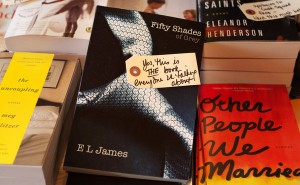
It still makes headlines whenever a self-published author manages to sell one million copies, or makes a major bestseller list. for some self-published authors, that level of success is actually a cumulative total of all of their titles, but it’s still quite a big deal. EL James might disagree. News came out this week that the Fifty Shades of Grey trilogy–admittedly all three books in the series combined–have now sold more than 100 million copies worldwide.
To be fair to the authors who are selling a “paltry” million or so, James was picked up by a traditional publisher and the books relaunched under Vintage Books’ imprint. Additionally, the titles have been translated into fifty-one languages for distribution in foreign markets, not taking into consideration the countries where English language titles sell rather well.
But what does it take to make a one-time Twilight fan fiction series that is still treated with such scornful, humorous consideration by the public into a global bestseller, with a major studio film adaptation in the works? Awesome marketing.
Beginning with the first efforts at publishing the books herself, James built a fan base around a work that was arguably unlike much else on the market. Once the series was invested in by a major publishing house, the author’s work didn’t stop. Successful and bestselling indie authors will share that same mentality with anyone who asks for the secret to their success: reader engagement is vital to selling books.
In last Tuesday’s Twitter chat #indiechat, hosted each week by BiblioCrunch, author Hugh Howey made an appearance to discuss the finer points of putting a well-crafted book in front of a broader reading audience. Besides sharing his post on advice for new authors, Howey made the statement: “I write in the morning. After lunch, I treat the publishing bits like my day job. I often work 16 hours a day.”
This attention to the business side of being an author is what sets apart those who sell books and grow a fan base, and those who don’t. Sadly, one of the business aspects that is becoming more and more clear–especially to authors who’ve handled it badly, like Lynn Shepherd, who has recently been accused of petty jealousy due to the fact that her traditionally published titles are not selling as much as many self-published authors’ works–is that authors must take on the responsibility for their own marketing. Regardless of the publishing route, crafting a work that readers want to read and then actively talking with them about that book is becoming more the norm.
Mercy Pilkington is a Senior Editor for Good e-Reader. She is also the CEO and founder of a hybrid publishing and consulting company.
